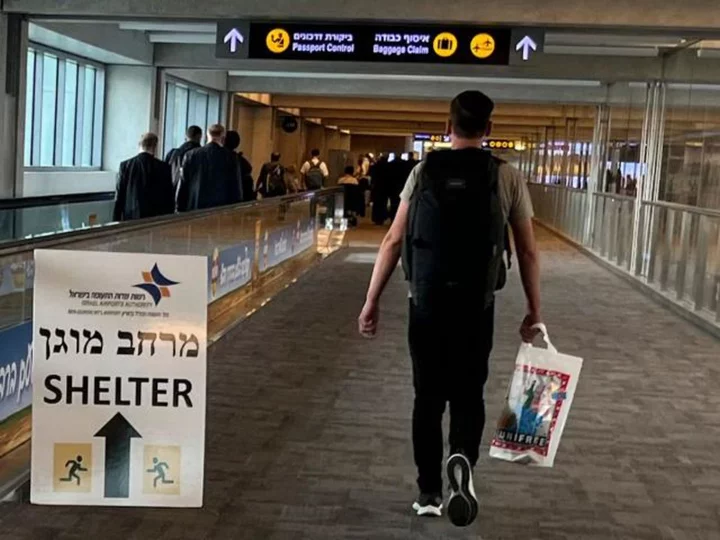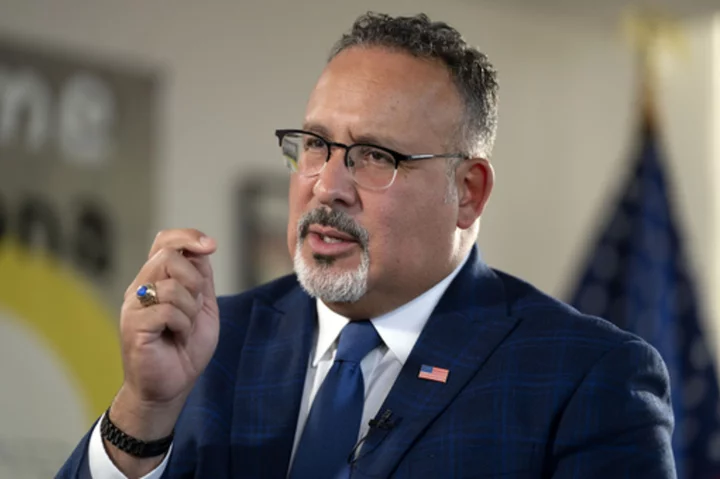The Biden administration said they'll begin chartering flights on Friday from Israel to destinations in Europe, as officials scramble to get Americans stranded in the war-ravaged country back home to the US.
Once the travelers get from Israel to Europe -- on Israeli, Turkish and other regional airlines -- they'll be ferried home by US-based and other carriers.
Worried about safety, United, American and Delta airlines all ceased operations to and from Ben Gurion International Airport in Tel Aviv, Israel's lone international airport, earlier this week. The US government charters are expected to open new routes for those fleeing the ongoing violence, however many flights and available seats there may eventually be.
But concerns about the danger, security and insurance coverage are still getting in the way of a more sweeping response to the overwhelming clamor for flights.
"We know there's a demand signal out there," Biden administration spokesman John Kirby told reporters Thursday, "and we're going to try the best we can to meet it."
A handful of non-US airlines have continued to operate out of Ben Gurion in the week since Hamas militants attacked Israeli civilians, killing at least 1,200 people and triggering a deadly barrage of Israeli strikes in Gaza. With the hostilities ongoing, the Federal Aviation Administration warned that it's a "potentially hazardous situation" to fly in the region.
European airlines are heeding the warnings. A British Airways flight aborted its approach into Tel Aviv facing rocket fire this week, and then the airline quickly joined the list of international carriers suspending service into Israel. KLM, Lufthansa and Air France have also done so.
Meanwhile, some travelers have been able to leave the country on one of the regional carriers, including the Israeli airlines El Al and Arkia. Also still operating are the UAE's Emirates airline, Turkish Airlines and the Russian airline Red Wings, according to data compiled by CNN from the tracking site FlightAware and the flight data provider Cirium.
El Al, the national Israeli airline, said it is seeing unprecedented demand, as many Israelis try to return home and others are trying to get out. El Al is adding two rare flights on Saturday, the Jewish sabbath, in order to get reservists back to Israel for duty, the airline said in a news release.
"Our primary goal is to bring tens of thousands of Israelis safely back to their families and to vital positions that support the ongoing campaign," the company posted on social media Thursday. "Simultaneously, we are committed to facilitating the safe departure of those who wish to leave the country."
Of the roughly 1,500 Tel Aviv flights scheduled between October 7 and October 12, more than 40% -- or 600 individual flights -- have been canceled, according to data from Cirium.
Meanwhile, the State Department just upgraded its advisory for travel to Israel to Level 3: "Reconsider Travel." They warn that "terrorists and violent extremists may attack with little or no warning, targeting tourist locations, transportation hubs, markets/shopping malls, and local government facilities."
Nevertheless, the State Department held a call with airlines earlier this week urging them to continue flying into Tel Aviv.
Some of those airlines pushed back, citing the government's own warnings about Israeli airspace, according to an airline source familiar with the matter. Airlines for America, representing the largest US carriers, told CNN that its members are ready to support "a structured, government-led effort to assist in the movement of U.S. citizens."
What has emerged from those discussions so far is Thursday's announcement that the US will organize charter flights for US citizens and their immediate family members from Israel to airports in Europe. That means US carriers will play a role but won't risk exposure to rocket fire.
US pilots are especially concerned about flying into the region in its current volatile state. A union president cautioned that it would not be "prudent or appropriate to knowingly put our flight crews and passengers in harm's way."
"Therefore, after careful consideration, I am directing all pilots to cease flight operations to Israel until we can be reasonably assured of the region's safety and security," Ed Sicher, representing American Airlines pilots as president of the Allied Pilots Association, wrote in a memo.
At this point, the way for Americans to evacuate is by flying out on a local carrier and connecting to US airlines overseas. But those flights are proving costly and difficult to obtain -- and may require multiple connections.
To support the effort, US carriers are increasing their flying to European hubs where flights departing Israel are landing.
"Right now we're looking at providing some additional lift to Europe," Delta CEO Ed Bastian said Thursday. "But no, we don't have any plans to be flying into Israel. It's considered unsafe for a US carrier to operate in that airspace."
United Airlines is taking a similar approach. They're adding extra flights to and from Athens, Greece, to help travelers flying between the US and Israel, the airline said in a statement.
United will operate six additional flights between Newark Liberty International Airport and Athens International Airport, which is roughly 700 miles from Tel Aviv and is still served by carriers such as El Al, and Israir, according to FlightAware.
The flights were set to depart for Athens on Thursday and Saturday, and on Monday of next week, the airline said. Flights back to the US are scheduled for Friday, Sunday and Tuesday.
But operating in an airspace where rockets are flying is considered risky.
Wartime and terrorism incidents are not covered by typical insurance policies held by the airlines, according to documents from the International Civil Aviation Organization.
That coverage is separate from regular airline insurance policies. Past incidents -- including 9/11 and the shooting down of Malaysia Airlines flight 17 -- have driven up the cost of coverage.
Some airlines are equipped with anti-missile defense systems using flares to divert heat-seeking missiles. El Al added the system to planes after a 2002 close call between an Israeli-operated Boeing 757 and two shoulder-fired missiles in Kenya.
That type of technology is not used by US airlines, although FedEx asked the FAA last year for permission to install defenses against heat-seeking missiles. The FAA ultimately did not move forward with the proposal.
US carriers say they're looking ahead to resuming flights. Delta announced it will resume selling tickets for November 1 flights. American's cancellation of Israel flights ends in early December.









